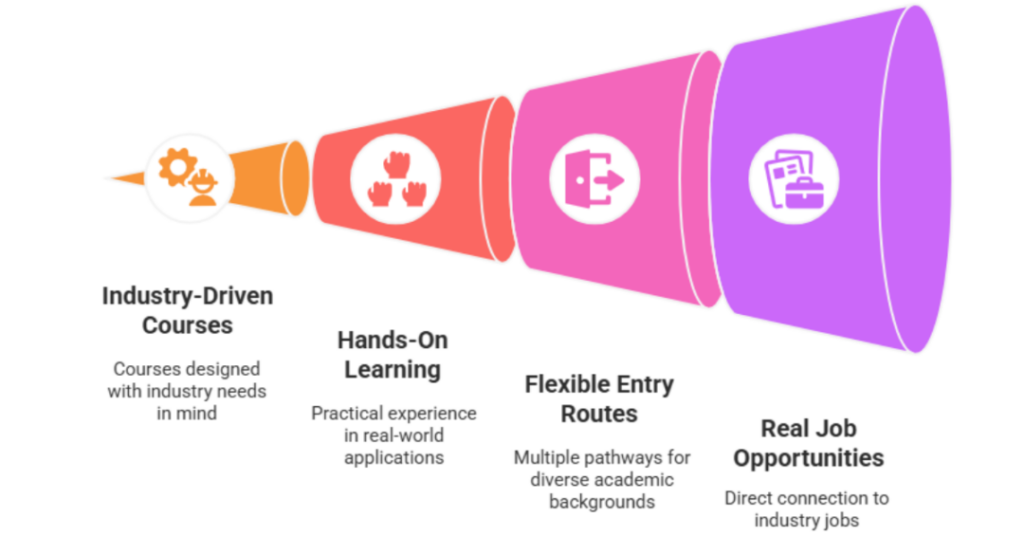23 June 2025
7 minutes read
How To Study Electrical Engineering In New Zealand As An Indian Student?

Key Takeaways
- Study electrical engineering in New Zealand to access globally respected courses built for real industry jobs.
- Choose top institutions like University of Auckland, AUT, and Victoria University of Wellington for cutting-edge labs and expert faculty.
- Meet entry requirements with flexible pathways like certificates or diplomas if you don’t have top grades in calculus or trigonometry.
In 2024 alone, over 3,000 international students enrolled in electrical engineering programs across New Zealand’s top institutes—but here’s the kicker: most of them didn’t even know which qualification would actually land them a job. Brutal, right?
The real struggle isn’t getting into an Institute of Technology — it’s figuring out what to study, where, and whether a fancy postgraduate degree is even worth it. If you’re serious about studying electrical engineering in New Zealand, forget the glossy brochures. This guide breaks down exactly what you need to know to make smart, career-driven choices before you waste time and money.
Why Study Electrical Engineering In New Zealand?
Apparently, if you can wire a toaster, you might just survive in this world—but if you want to build the systems that actually run cities, you’re going to need more than YouTube tutorials. Studying electrical engineering in New Zealand isn’t just another checkbox on your LinkedIn; it’s where practical experience meets serious career opportunities.

Forget overpriced degrees with fluffy lectures—New Zealand’s engineering courses are built on theory and practice, preparing you to work with real systems, real equipment, and real employers who don’t care how many times you “liked” Elon Musk’s tweets. Here’s what nobody told you about why this is one of the smartest moves you can make.
1. World-Class, Industry-Driven Courses (No Fluff)
Forget the boring lectures you’ve heard about. Electrical engineering courses in New Zealand are designed with industry, not just for “academic honour.” Programs like the New Zealand Diploma in Engineering, Bachelor of Engineering Technology, and the Bachelor of Engineering with Honours are tailored for the jobs actually available in power distribution, automation, and communication networks. You don’t just memorize electronic principles—you apply them to equipment that produce electricity and power the world.
2. Universities That Actually Know What They’re Doing
Ever heard of the University of Auckland, AUT (Auckland University of Technology), Victoria University of Wellington, or University of Canterbury? These are not just names—they’re the institutions in New Zealand driving innovation in electrical and electronic engineering. And with smaller class sizes compared to global tech schools, you don’t just sit in the back—you build things. Want cutting-edge power electronics or automation labs? Sorted.
3. Real Pathways, Real Jobs
Don’t get stuck in the academic hamster wheel. Engineering degrees here lead to actual work, not just theoretical nonsense. With a minimum of 48 NCEA credits at Level 2, including at least 12 credits in mathematics, plus literacy credits, you can enter courses that are connected directly to industries. Think energy systems, electrical power, and computer engineering. Toi Ohomai Institute of Technology, Otago, and Unitec Institute of Technology all equip you with the skills to work from day one.
4. Flexible Entry Routes For All Backgrounds
Not everyone’s got the perfect grades—and that’s fine. Didn’t smash calculus or trigonometry in school? You can start with a Certificate in Electrical Engineering or take related subjects to build up to a full electrical engineering degree. Even with band scores lower than 5.5 in IELTS, there are pathways available. Whether you’ve got achievement standards in algebra or credits at Level 2 in four subjects, New Zealand’s engineering qualification system gives multiple routes to success.
5. Practical Knowledge Beats Paper Degrees
You’ll graduate with an in-depth understanding of how to design, build, and maintain energy systems—and not just diagrams on PowerPoint slides. From fundamentals of electrical engineering to advanced automation, the programs mix theory and practice so you don’t graduate with just paper. Employers love graduates who can talk and build—and these universities in New Zealand know it. Engineering studies here actually equip you to use electricity, not just talk about it.
What Are The Study Options and Entry Criteria?
When considering a career in electrical engineering in New Zealand, it’s essential to explore the various study options available and understand the entry criteria for each program. Here, we will delve deeper into the study pathways and the specific requirements you need to meet to pursue your dream of becoming an electrical engineer.
Diploma in Engineering
The New Zealand Diploma in Engineering (Level 6) is an excellent starting point for those looking to enter the field of electrical engineering. This program provides a comprehensive understanding of electrical and electronic principles and offers a practical approach to learning. It typically spans two years and covers a wide range of topics, including electrical power systems, automation, and engineering mathematics.
Entry Criteria
To enroll in a Diploma in Engineering program, you generally need to meet the following entry criteria:
- NCEA Level 2: You should have completed Level 2 in four subjects, including mathematics. Specifically, having at least 12 credits in mathematics, particularly in algebra, is preferred.
- Language Proficiency: If English is not your first language, you may need to provide evidence of English language proficiency, such as achieving a specified score on the International English Language Testing System (IELTS) or an equivalent English language proficiency test.
- Additional Requirements: Some institutions may have additional requirements or prerequisites, so it’s crucial to check the specific program details of the institution you wish to apply to.
Bachelor’s Degrees in Electrical Engineering
For those seeking a more in-depth and specialized education, pursuing a Bachelor of Engineering or Bachelor of Engineering Technology degree is an excellent choice.
These programs typically span three to four years and offer a more extensive exploration of electrical and electronic engineering topics. You’ll have the opportunity to choose from various specialized tracks, including:
- Power Engineering: Focusing on the generation, distribution, and utilization of electrical power.
- Computer Engineering: Emphasizing the design and development of computer hardware and software systems.
- Mechatronics Engineering: Integrating mechanical engineering, electronics, and computer science to create intelligent systems and products.
Entry Criteria
Entry requirements for Bachelor’s degree programs in electrical engineering may vary slightly among institutions, but here are the common criteria you should be prepared to meet:
- NCEA Level 3: You’ll typically need to have completed NCEA Level 3 with specific subject requirements that may include mathematics and physics.
- Language Proficiency: International students may need to demonstrate English language proficiency through tests like IELTS or provide other acceptable proof of language competence.
- Interview or Portfolio: Some universities may require you to attend an interview or submit a portfolio showcasing your interest and background in electrical engineering.
- Prerequisites: Certain programs may have prerequisites in subjects like physics or calculus, so it’s crucial to review the program-specific requirements of the institution you’re interested in.
International Students
If you’re an international student considering studying electrical engineering in New Zealand, there are additional factors to consider:
- Visa Requirements: Ensure you have the appropriate student visa to study in New Zealand. Check the latest visa requirements and application processes through the New Zealand Immigration website.
- English Language Proficiency: Meeting the required English language proficiency is vital. Universities typically require a minimum IELTS score of 6.0 for undergraduate programs, but specific requirements may vary by institution.
- Transcripts and Documentation: Prepare your academic transcripts, certificates, and any other required documentation for your application. These documents should be in English or accompanied by certified translations.
- Financial Proof: You may need to demonstrate your financial ability to cover tuition fees and living expenses while studying in New Zealand.
- Health Insurance: Ensure you have health insurance coverage during your stay in New Zealand as it’s a mandatory requirement for international students.
Universities in New Zealand
New Zealand boasts several prestigious institutions where you can pursue electrical engineering:
University of Auckland
The University of Auckland is renowned for its comprehensive electrical engineering courses and cutting-edge research. Here, you’ll have access to state-of-the-art facilities and expert faculty members who are leaders in their fields. The University of Auckland’s electrical engineering program provides a solid foundation for your future career.
Auckland University of Technology (AUT)
AUT offers a Bachelor of Engineering Technology program with a strong focus on practical knowledge and skills. This university is known for its industry connections, ensuring that students are well-prepared for the demands of the real world. If you value hands-on experience and want to hit the ground running in your career, AUT is an excellent choice.
University of Canterbury
The University of Canterbury is known for its expertise in electrical power systems and automation courses. If you’re interested in the efficient generation and distribution of electrical power or the cutting-edge field of automation, this institution has the resources and programs you need to excel.
University of Waikato
At the University of Waikato, you’ll gain an in-depth understanding of communication networks and energy systems. The university’s electrical engineering programs are designed to provide you with the knowledge and skills needed to work on professional engineering projects, making you highly competitive in the job market.
Victoria University of Wellington
Victoria University of Wellington offers programs that focus on equipping students with the knowledge and skills to work on professional engineering projects. The university’s electrical engineering courses emphasize theory and practice, ensuring that graduates are well-prepared for the challenges of the field.
What Are The Career Opportunities?
Studying electrical engineering in New Zealand opens doors to various career opportunities, including:
Power Distribution and Generation
As an electrical engineer, you can work on the infrastructure that powers cities and industries. This field is essential for ensuring a stable and efficient supply of electricity to homes, businesses, and factories.
Energy Systems
New Zealand is a leader in renewable energy, making it an ideal place to work on sustainable energy solutions. Electrical engineers in this field play a crucial role in developing and optimizing energy systems powered by renewable sources like wind, solar, and hydroelectricity.
Communication Networks
The expansion and improvement of global communication networks are ongoing processes. Electrical engineers contribute to this growth by designing, maintaining, and enhancing communication systems, including wireless networks, fiber optics, and satellite communication.
Professional Engineers
Becoming a professional engineer in New Zealand is a prestigious achievement. It opens doors to a wide range of industries and projects, from renewable energy initiatives to cutting-edge technology developments. Professional engineers are in high demand and are well-compensated for their expertise.
Conclusion
Studying electrical engineering in New Zealand not only provides you with a solid foundation in electrical and electronic engineering but also offers picturesque landscapes and a thriving industry.
With a variety of programs, world-class universities, and promising career prospects, New Zealand is the ideal destination for those fascinated by electricity and eager to make a significant impact in the field.
To get into a top New Zealand university, you need more than just good grades—you need a game plan. Ambitio’s AI-powered platform and expert consultants guide you through every step, from choosing the right university to securing study permits and work opportunities. No guesswork, no wasted time—just a clear, structured path to studying in Canada. If you’re ready to make studying in New Zealand a reality, Ambitio is your best bet.
FAQs
1. What qualifications are needed to study electrical engineering in New Zealand?
To study electrical engineering, you typically need Level 2 in four subjects, including at least 12 credits in mathematics, preferably algebra. You may also need to achieve 48 NCEA credits at Level 2.
2. Are there specific entry criteria for international students?
International students may require an IELTS score higher than 5.5 and must fulfill the program-specific entry requirements set by universities.
3. Can I work part-time while studying electrical engineering in New Zealand?
Yes, international students on a valid student visa are usually allowed to work part-time during their studies.
4. What career prospects does electrical engineering offer in New Zealand?
Electrical engineering graduates can pursue careers in power distribution, energy systems, communication networks, and more. New Zealand values the contributions of skilled electrical engineers.
5. How do I apply for electrical engineering programs in New Zealand?
You can start by contacting the universities directly or using the institutions’ online enrollment platforms. It’s also recommended to check individual program websites for specific application details.

You can study at top universities worldwide!
Get expert tips and tricks to get into top universities with a free expert session.
Book Your Free 30-Minute Session Now! Book a call now




























